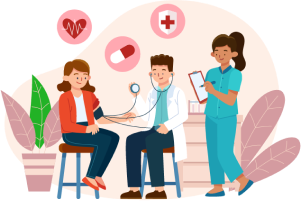Abdominal pain due to digestive disorders, how to take medicine?
Source: Health and Life
There are many causes of digestive disorders (diarrhea, constipation, indigestion…) with the common symptom being abdominal pain. So how to handle it properly and safely?
1. Abdominal pain due to diarrhea
Cause:
Diarrhea is a common occurrence, with symptoms of loose, watery stools accompanied by cramping pain and the urge to defecate…
The cause of diarrhea can be: Contaminated food or water, due to change environmental changes or stress in people with intermittent diarrhea.
How to prevent diarrhea:
– Avoid contaminated food and water.
– Source bottled water should be used; Avoid using ice as it can come from unclean water.
– Choose food and drink carefully; eat only food that is cooked and served hot; Only eat raw fruits and vegetables after washing or peeling them with clean water.
– Wash your hands often with soap and clean water, especially after using the toilet and before eating. Alcohol-based hand sanitizer can be used as a precaution.

Many people get stomachache while traveling…
Take medicine for diarrhea
The most dangerous complication of diarrhea is dehydrated. Therefore, the most important thing is to replace lost water by drinking bottled water, low-sugar sports drinks containing electrolytes, or oresol solutions mixed as directed. You can also drink fruit juices, smoothies…
Some may be used over-the-counter drugs such as loperamide or bismuth subsalicylate… helps reduce frequency loose, watery stools and relieve abdominal pain.
Note, need to read carefully before using the drug. Loperamide is not for use in children under 12 years of age. Absolutely do not use antibiotics or anti-diarrheal drugs without consulting your doctor.
Most episodes of diarrhea go away on their own after a few days. However, if bloody diarrhea, severe abdominal pain, fever, or diarrhea persists for more than a week or two… seek medical attention.
2. Abdominal pain due to constipation
Cause
Due to unreasonable diet and activities such as: Low fiber diet, excess fat of animal origin, eating a lot of sugar, coffee, tea, alcohol, not drinking enough water; inactivity; frequent delay in defecation…
How to prevent constipation:
– Increase fiber: Make sure your pre-travel diet includes plenty of fiber, which makes stools softer and easier to pass. Foods rich in fiber include: Apples (with skin), raspberries, pears, beans, whole grains. Fiber supplements can be used.
– Don’t eat too much fiber at once as it can lead to gas and bloating.
– Need to drink enough water, about 2 liters/day.
Colon pain while traveling: What is the safe way to take medicine ? – Picture 3.
When traveling, drink enough water to avoid constipation

Take medicine for constipation
In case of constipation while traveling, you can use the laxative over the counter.
– Blocking agents such as: Calcium polycarbophil, methylcellulose, and psyllium… These may take a day or longer to work. Note, take the medicine with a lot of water.
– Stool softeners: Medicines that help soften stools to make them easier to pass, including those containing sodium docusate…
Patients need to read the instructions carefully before using the drug, if constipation persists, they should discuss with their doctor for timely advice and treatment.
3. Abdominal pain due to bloating, indigestion
Cause:
Eating too much, eating indigestible foods (starchy foods, high in fiber, fat, using alcohol, tobacco, carbonated drinks…); improper eating (eating too fast, not chewing well, eating at the wrong time, on time, lying down while eating, watching TV while eating) … is the cause of bloating and indigestion.
How to prevent indigestion:
– Limit drinking parties.
– Avoid irritating foods: Many people with Irritable Bowel Syndrome have trouble tolerating foods high in carbohydrates. Common carbohydrate-rich foods are dairy products, broccoli, beans and lentils, wheat, garlic, onions, apples, and fruit juices.
– Eat small meals: Overeating can increase the risk of indigestion. Therefore, to avoid indigestion, eat smaller portions several times a day.
– Eat slowly, chew thoroughly: Excess gas can also arise if you swallow too much air from eating too quickly or talking while eating.
Take medicine for indigestion:
Indigestion usually goes away on its own in a short time, but there are ways to ease the process. Depending on the medication, depending on the symptoms of indigestion, you can use over-the-counter drugs:
– Antacid: This is a group of antacids, which neutralize stomach acid to reduce symptoms caused by excess stomach acid.
Coping with diarrhea while traveling calendar

– Bismuth subsalicylate: Medicine for upset stomach…
– Acid suppressants to relieve heartburn: Proton pump inhibitors such as omeprazole, lansoprazole, or H2 blockers such as famotidine…
– Rapid air reliever containing simethicone.
Note, when using the drug, read the instructions carefully. If indigestion persists, often, it is necessary to talk to a specialist for specific instructions and timely treatment.
The articles on this website are for reference only and do not replace medical diagnosis or treatment. Please do not follow them on your own
Make a question

If you have any questions, please contact us via contact information, or fill in the form below.
Schedule a consultation appointment with the doctor
Before you leave, leave your information so we can send you medical news that may be of interest to you..

The doctor does not have an appointment scheduled, please choose another day

Note: The appointment time is only approximate, T-Matsouka will contact to confirm with customers after receiving the examination schedule information. Thank you for waiting for a response from T-Matsuoka.






Star rating:
Sort by :
No reviews yet.